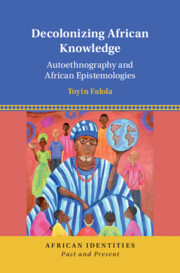Book contents
- Decolonizing African Knowledge
- African Identities: Past and Present
- Decolonizing African Knowledge
- Copyright page
- Dedication
- Contents
- Figures
- Notes on Language and Orthography
- Preface
- Acknowledgments
- Part I Introduction
- 1 Prologue: My Archive
- 2 Autoethnography and Epistemic Liberation
- Part II History, Fictions, and Factions
- Part III Visual Cultures
- Part IV Conclusion
- Bibliography
- Index
2 - Autoethnography and Epistemic Liberation
from Part I - Introduction
Published online by Cambridge University Press: 23 June 2022
- Decolonizing African Knowledge
- African Identities: Past and Present
- Decolonizing African Knowledge
- Copyright page
- Dedication
- Contents
- Figures
- Notes on Language and Orthography
- Preface
- Acknowledgments
- Part I Introduction
- 1 Prologue: My Archive
- 2 Autoethnography and Epistemic Liberation
- Part II History, Fictions, and Factions
- Part III Visual Cultures
- Part IV Conclusion
- Bibliography
- Index
Summary
This chapter highlights how colonial institutions, especially Western education through academic knowledge, have helped to sustain the “colonial matrix of power.” Its corrupted nature is reflected in the extrapolation of data from Africa (subaltern culture) and rebranding them as Western, which is to the detriment and exclusion of Africans and a support structure for Western hegemony. The solution to this imbroglio as proffered by the author is “decoloniality,” a process that combats the root of the problem seeking to “dismantle the colonial matrix of power,” and enhancing the practice of “subaltern epistemology,” which is the means to achieve what he referred to as “epistemic liberation.” The systematic process to achieving this is what the chapter sets out to do here: show how the academic sustains the colonial matrix of power, examine the biases associated with ethnography, “deconstructs the researcher’s role in it,” bridge the gap between quality research and subaltern epistemology, and lastly, how to achieve epistemic liberation using autoethnography. Using autoethnography as the methodology, the researcher explains and justifies why the researcher, for a proper interpretation of African cultural ethos, has to be the researched.
Keywords
- Type
- Chapter
- Information
- Decolonizing African KnowledgeAutoethnography and African Epistemologies, pp. 19 - 42Publisher: Cambridge University PressPrint publication year: 2022

